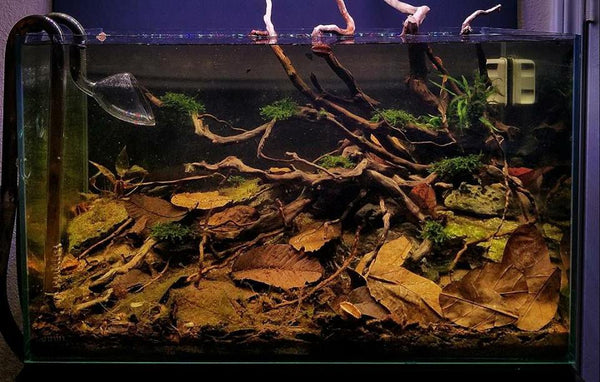- Continue Shopping
- Your Cart is Empty
There will be decomposition.
Our crowd thinks a bit differently than most in the hobby, I'd venture to say.
We're advocating the addition of botanical materials to our aquariums as a matter of course, for the everyday purpose of replicating, to some extent, the natural processes which occur in the wild habitats of our fishes.

And we spend a great deal of time examining the processes which occur when leaves and other botanicals are added to the aquarium. This is important, not only from an aesthetic standpoint, but from an ongoing functional/operational standpoint.
It definitely differs from our practice in decades past, where the idea of throwing in materials that affect the water quality/composition was strictly a practice reserved for speciality hobbyists, like killifish breeders, Dwarf Cichlid keepers, etc., who wanted to create special conditions specifically to facilitate breeding.
We understand- or are attempting to understand- the impact on both our aquariums' ecology and the husbandry involved. It's the idea of creating an aquascape that is not only good-looking and interesting, but one which provides environmental enrichment and ecological advantages for its resident fish population.
It involves change.
It involves decomposition.
Yeah, it's sort of a different approach.
And I think we can embrace it further by considering how the botanical materials we select for our aquariums "behave" upon submersion into water. A carefully constructed botanical hardscape, IMHO, should have some-more-or-less "permanent" things, like rocks and driftwood, complemented and be enhanced by "degradable" items, such as Catappa, Guava, and other leaves, as well as the "softer" pods and such.

And of course, these botanical materials not only offer enhanced aesthetics- they offer enrichment of the aquatic habitat through their release of tannins, humic acids, vitamins, etc. as they decompose- just as they do in nature.
Leaves and such are simply not permanent additions to our 'scapes, and if we wish to enjoy them in their more "intact" forms, we will need to replace them as they start to break down.
This is not a bad thing.

Much like flowers in a garden, leaves will have a period of time where they are in all their glory, followed by the gradual, inevitable encroachment of biological decay.
At this phase, you may opt to leave them in the aquarium to enrich the environment further and offer a new aesthetic, or you can remove and replace them with fresh leaves and botanicals. Again, this is very much replicates the process which occur in nature, doesn't it? Stuff either remains "in situ" as part of the local habitat, or is pushed downstream by wind, current, etc.
Pretty much everything we do in a botanical-style blackwater aquarium has a "natural analog" to it!

Some hobbyists have commented that, as their leaves and botanicals break down the scape as initially presented changes significantly over time. Wether they know it or not, they are grasping "Wabi-Sabi"...sort of. One must appreciate the beauty at various phases to really grasp the concept and appreciate it. To find little vignettes- little moments- of fleeting beauty that need not be permanent to enjoy.
And, despite their impermanence, these materials function as diverse harbors of life, ranging from fungal and biofilm mats, to algae, to micro crustaceans and even epiphytic plants. Decomposing leaves, seed pods, and tree branches make up the substrate for a complex web of life which helps the fishes that we're so fascinated by flourish.
And, if you look at them objectively and carefully, these assemblages are beautiful.

This is not something new or previously unconsidered by the hobby, but it's something we don't give much thought to, I think.
We just plug along, feeding our fishes, doing water exchanges, and growing plants. We tend to our aquascapes, and watch things grow. And, over time, even the most diligently-maintained aquariums tend to look significantly different than when they did when they were first assembled.
It's how natural systems go.
There will be change. There will be decomposition.
Stay observant. Stay diligent. Stay curious. Stay in synch. Stay thoughtful...
And Stay Wet.
Scott Fellman
Tannin Aquatics








Scott Fellman
Author